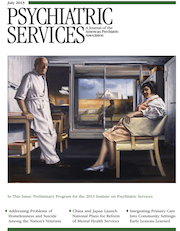News Briefs
New AHRQ resources on accountable care organizations: The accountable care organization (ACO) is a care delivery and payment model in which a group of coordinated health care providers—primary care physicians, specialists, and hospitals—are collectively accountable for the quality and cost of care for a defined group of patients. ACOs have the potential to effectively align incentives for partners and provide better quality care at lower costs. However, only about 10% of Americans receive care under this model. New resources posted on the Innovations Exchange Web site of the Agency for Healthcare Research and Quality (AHRQ) provide detailed accounts of the implementation and operation of two ACOs that have achieved early goals. One operates under an annual global budget for individuals covered by the California Public Employees Retirement System. The other is a county-based ACO in Minnesota that integrates medical, behavioral, and social services for newly enrolled Medicaid beneficiaries in Hennepin County. The AHRQ site also features two tools related to ACOs. The Safety Net Accountable Care Organization Readiness Assessment Tool is designed for administrators and staff to assess their organization’s readiness to take on the responsibilities of becoming an ACO. The Physician's Accountable Care Toolkit provides information about essential elements of a successful ACO and step-by-step implementation guidance. These and other resources are available on the AHRQ Web site at www.innovations.ahrq.gov/issue.aspx?id=153.
Lessons from Medicaid and CHIP for outreach and enrollment under the ACA: The Affordable Care Act (ACA) will significantly increase coverage options via Medicaid expansion and health insurance exchanges. But outreach and enrollment efforts are critical to ensuring coverage of more Americans. A 16-page issue brief from the Kaiser Commission on Medicaid and the Uninsured identifies five lessons learned by Medicaid and the State Children’s Health Insurance Program (CHIP). The first is that most individuals value the Medicaid program and would enroll if they were eligible—for peace of mind and protection from large medical bills and to be able to focus on other goals for themselves and their families. The second lesson is to use a combination of broad and targeted outreach strategies because people learn about Medicaid and CHIP via multiple avenues, including word of mouth, mass media, and health care providers, and have varied preferences about where and how to receive information. The third lesson is about the process: providing accessible, welcoming, and family-friendly application and enrollment processes helps reduce barriers. Many studies have found that offering multiple enrollment avenues, eliminating interviews, and reducing documentation requirements contribute to increases in Medicaid enrollment. In particular, use of electronic data to verify information and automatically enroll individuals reduces paperwork burdens for both applicants and eligibility workers. Providing one-on-one enrollment assistance from trusted individuals in the community is a key component of successful efforts and the fourth key lesson. The fifth lesson involves promoting maintenance of coverage by facilitating renewals. Extending the length of time between renewals and providing continuous eligibility and simplifying renewal procedures increases retention. The issue brief is part of “Getting Into Gear for 2014,” a series examining key implementation issues as states prepare for ACA coverage expansions (kff.org/Medicaid).
New workplace initiative to raise depression awareness: The Partnership for Workplace Mental Health, a program of the American Psychiatric Foundation, has launched Right Direction, an initiative to help employers raise awareness about depression in the workplace, promote early recognition of symptoms, and reduce stigma. Right Direction seeks to increase appropriate utilization of employee assistance programs and behavioral health benefits to increase productivity and decrease disability costs to employers. The site provides educational materials about depression for employees and resources for obtaining help. An “Employer Field Guide” gives employers a step-by-step implementation plan. The Partnership collaborated with Employers Health, a national employer coalition based in Ohio, to develop Right Direction (www.rightdirectionforme.com).
HSRI’s free simulation model to assist in service planning: The Human Services Research Institute (HSRI) has developed a free, Web-based simulation model, Planning by the Numbers Free (PBN Free), to assist in planning service systems for persons with serious mental illness. PBN Free aids in activities such as budget and bed need planning and preparing for ACA implementation. It presents users with three service system scenarios: a basic service system, a maintenance-oriented system, and a recovery-oriented system. Scenarios are largely prepopulated with data but require some local inputs, such as numbers of consumers to be served at prespecified functional levels, local unit costs of services, and percentage of consumers eligible for reimbursement by Medicaid or other payers. The model forecasts consumers served, service utilization, outcomes, costs, and revenues for any planning period. Users can implement, compare, and save various scenarios. PBN Free is available at http://model.planningbythenumbers.org.



